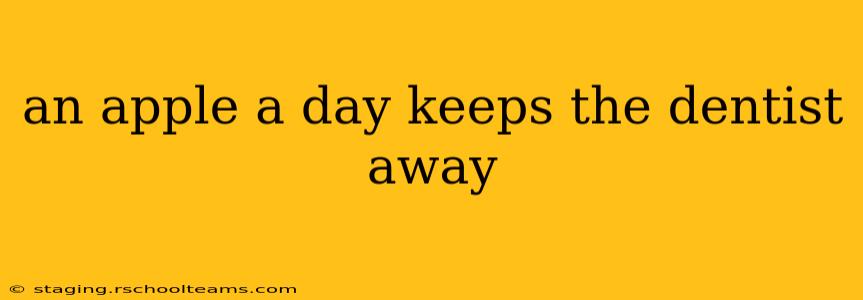The old adage, "An apple a day keeps the dentist away," is a catchy phrase that's been passed down through generations. But is there any truth to this claim? While it's not a foolproof guarantee of perfect dental health, the saying holds a kernel of truth, thanks to the unique properties of apples. This post will delve into the science behind this common saying, exploring the benefits and limitations of apples for dental health.
What Makes Apples Good for Teeth?
Apples' positive impact on oral health primarily stems from their fibrous texture and natural acidity.
-
Fibrous Texture: The act of biting and chewing an apple stimulates saliva production. Saliva is crucial for oral health; it neutralizes acids produced by bacteria, washes away food particles, and strengthens tooth enamel. The more you chew, the more saliva you produce, naturally cleaning your teeth. Think of it as a natural toothbrush!
-
Mild Acidity: While apples are acidic, their pH level is generally not low enough to significantly erode enamel. The combination of the fiber and saliva production helps mitigate any potential negative effects of the acid. However, it's important to note that excessive apple consumption could contribute to enamel erosion in some individuals.
Does an Apple Replace Brushing and Flossing?
No. While apples contribute positively to oral hygiene, they are not a replacement for proper brushing and flossing. Apples can help remove some food particles, but they cannot reach all areas of the mouth, particularly between teeth. Regular brushing and flossing remain essential for preventing cavities and gum disease.
How Often Should I Brush My Teeth?
The American Dental Association (ADA) recommends brushing your teeth twice a day for at least two minutes each time, using fluoride toothpaste. This removes plaque, the sticky film that harbors bacteria and leads to cavities.
How Often Should I Floss?
Flossing should be done at least once a day to remove food particles and plaque from between teeth, areas that a toothbrush cannot reach.
What About Other Fruits and Vegetables?
Apples aren't the only fruits and vegetables beneficial for dental health. Many crunchy fruits and vegetables, such as carrots, celery, and pears, offer similar benefits due to their fibrous texture and saliva-stimulating properties.
Can Too Many Apples Harm My Teeth?
While generally beneficial, excessive apple consumption could have some drawbacks. The natural sugars in apples can fuel the growth of bacteria, potentially leading to cavities if not balanced with proper oral hygiene. Additionally, the mild acidity, if consumed in large quantities, could contribute to enamel erosion over time. Moderation is key!
Are There Any Other Ways to Improve My Dental Health?
Maintaining optimal dental health involves a multifaceted approach:
-
Regular Dental Checkups: Visit your dentist for regular checkups and cleanings to prevent and detect potential problems early.
-
Healthy Diet: Limit sugary drinks and snacks to minimize bacterial growth.
-
Hydration: Drink plenty of water throughout the day to help wash away food particles and maintain saliva production.
In conclusion, while "an apple a day keeps the dentist away" is a simplification, the saying highlights the positive contribution apples can make to your oral health. However, it's crucial to remember that regular brushing, flossing, and dental checkups are vital components of a comprehensive dental care routine. Apples are a helpful addition, not a replacement for these essential practices.
